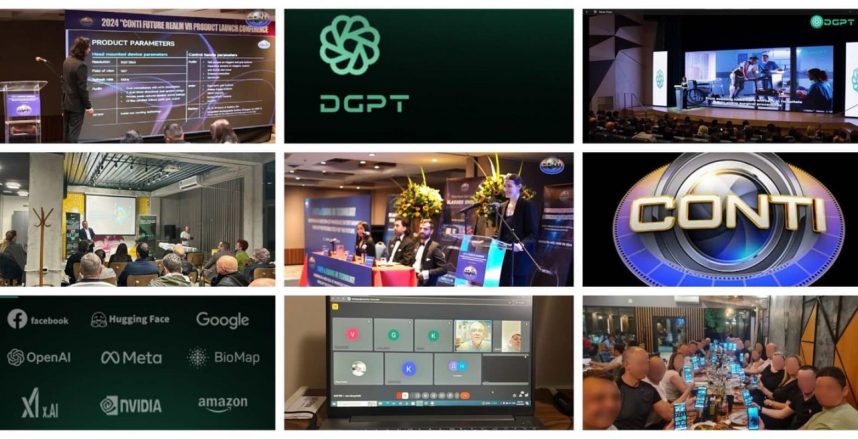
Thousands of people in North Macedonia have been stung by purported investment apps that promised big payouts to users who recruited their friends and relatives, and then collapsed.
Based on referral only, both apps had promised huge earnings for anyone prepared to invest at least 50 euros in cryptocurrency and perform simple daily tasks such as watching a video or clicking a button to start the app. The more people a user invited to join, the more money they stood to earn. Until it all collapsed.
Photos of smiling Macedonians holding phones lit up with the DGPT logo have disappeared from social media, as have posts by individuals promoting the apps.

A webinar in North Macedonia promoting DGPT actrivities. Photo: BIRN
Among the pyramid scheme’s most vocal promoters was Aleko Shemko, who until May was executive director of the right-wing Macedonian Concept, a political party not represented in parliament.
Shemko did not respond to a request for comment. The party said it had not been in contact with him for a year. DGPT asked its users for patience and promised they would be paid back.
“I regret investing; I thought it would last through the month and I would get my money back,” said a 39-year-old investor in DGPT. “No one wants to admit that they lost money, but everyone who fooled themselves into investing here lost in the end.”
Similar applications, same scheme
In the beginning, Conti went out of its way to appear legitimate. Those behind it first registered in Britain and then issued PR statements claiming enormous growth. The claims went unchallenged.
Through local representatives, Conti opened up two offices in North Macedonia – one in Radovish in the southeast and another in Kavadarci in the south. It sponsored a futsal club and advertised in the East Gate Mall in the capital, Skopje.
When fraud warnings began surfacing online, Conti published a video of a press conference it claimed took place in London, but media in Slovenia analysed the video and found it was recorded in Colombia. One of the speakers turned out to be an actor playing a satisfied investor.

Conti published a video of a press conference it claimed took place in London. Printscreen: BIRN
Two weeks later, DGPT held its own ‘conference’. The same woman who appeared at the Conti presser addressed the DGPT’s own event as CEO Sarah Thomson; the other individuals identified as company directors could not be found online, while the app has repeatedly changed its website.
Roughly 100 people responded to a BIRN questionnaire about their experience with such apps. The scams appear to have been very successful in North Macedonia.
“I deposited $500,” wrote one respondent. “I was supposed to receive $22 per day but suddenly the application stopped transferring money and now they are even asking for $100 dollars to activate it. It’s a catastrophic application.”
Another wrote: “The worst thing was that the people who entered the scheme earlier then organised public presentations explaining how to invest [or, more precisely, how to lose money]. Sometimes, there were people who looked decent and serious, so you say to yourself: ‘If they invested, why shouldn’t I?’ It’s another way of pulling you in deeper because you start to include relatives, friends and acquaintances in the ‘game’.”
Investments continue
North Macedonia’s Financial Intelligence Authority says it is monitoring such scheme and has urged the public not to invest in “fictitious and fraudulent investment platforms”.
Conti and DGPT are not the only such apps out there, yet police say they have not received any complaints from scammed investors.
One user, a 32-year-old man from Kavadarci, said no one went to the police because they were pulled into the scheme by their own friends or relatives.

The same woman who appeared at a Conti press conference addressed the DGPT’s event as CEO Sarah Thomson. Printscreen: BIRN
The man said he invested in Conti in May, when the whole town was talking about it. He invested several hundred euros and recruited his wife, cousins and close friends. It was an adrenaline rush, he told BIRN.
“The fear was the same every day – that the app will disappear,” he said. “You know it won’t last, but you say to yourself – what if it does?”
Mijalce Santa, an economics professor at the St Cyril and Methodius University in Skopje, said such apps were classic examples of social engineering, in which users are promised incredible earnings while the first investors are paid with money from those who follow. Trust is key, he said. Hence why they thrive in places like North Macedonia, where family and social ties are close.
“A buzz is created around the app and it becomes important for you to be part of the group, to say you’re in it,” Santa told BIRN.
Then comes the adrenaline rush, making quitting much more difficult.
“It will happen again in three years’ time,” he said. “That’s enough time to forget what is happening now.”